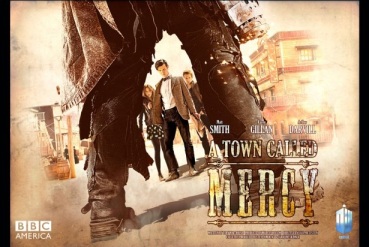'A Town Called Mercy'
 Written by Toby Whitehouse
Written by Toby Whitehouse
Story 7.03
Transmitted 15 September, 2012
"Frightened people. Give me a Dalek any day."
The Doctor arrives in the old western town of Mercy and is almost immediately thrown back out of it by the angry townsfolk. There is clearly something odd going on as the inhabitants are wary of strangers and benefiting from electric lighting and heat. When the sheriff Isaac takes the Doctor in, he reveals the reason behind the fear and the savior of the town known as Mercy, a man who fell from the stars named Kahler Jex (or the Doctor). A gunslinger from another world, his body fused with his weapon, waits for Jex on the outskirts, but refuses to take action for fear of harming an innocent. Mercy has come into to the crossfire of a conflict far outside of its understanding, and it will take the Doctor's intervention to set things right.
Just why the Doctor is once more travelling with Amy and Rory is unclear. In the classic program, the companions were stuck with the Doctor, unable to get back home and often in a panic at the non-stop dangerous lifestyle that the Doctor led. However, the new series sees the TARDIS as a pleasure yacht used to see Ian Drury in concert or pop round to Mexico for the Day of the Dead festival. It's all very odd and I'm sure it only strikes some viewers as peculiar... but I'm one of them.
A Town Called Mercy is the first story of the BBC Wales Doctor Who program in quite some time to actually be about something. At first sight the Doctor sees Jex as an innocent on the run from a monstrous alien cyborg looking suspiciously like a certain terminator (he even has the same grid-like vision issues). However, when the Doctor breaks into Jex's ship he finds that the alien doctor is not the saint that he appears to be.
When he returns, the Doctor proclaims Jex for the war criminal that he is and is unsure of how to proceed. The 'monstrous' cyborg is just one of an army of such creatures made by Jex and those like him to fight in a war on an alien world. When the war was over, one of the cyborgs broke free from his programming and sought revenge on its creators for the crimes it had endured. Just sending Jex to his fate as the townsfolk would want seems the most obvious solution and for once the Doctor agrees.
Frustrated with a life of mercy that has led only to more death, the Doctor seems prepared to try another way, one that would spare the universe of more killings from the Master, Daleks or countless other monsters. But, as Amy points out, this reduces the Doctor to the level of his nemesis, making him no greater than the evil that he fights against. The moment when Amy Pond stops the Doctor from sacrificing Jex completely validates the quandary of 'why is the Doctor still travelling with Rory and Amy' that has bothered me this series, well, at least partly. Rory still has sweet FA to do.
The only real problem with A Town Called Mercy aside from its suspicious similarities to the Red Dwarf story 'Gunmen of the Apocalypse' is that it has more to say than the shortened 45 minute format allows. Once the Doctor accepts that he must find another non-violent solution to the problem, very little time is left in which to hatch said plan.
In the end, the solution is rather slapdash and hackneyed. Getting the townsfolk to wear a facial tattoo similar to that worn by Jex is a flawed notion since not long ago the cyborg was fooled by someone nothing like the alien wearing the same hat and coat. Clearly the gunslinger's effectiveness is hampered by the constraints of the plot. Also, the Doctor's plan of helping Jex escape is not a very good one at all and only postpones the problem while extending the danger to another planet. Even Jex sees the flaws in this, leading to him taking the coward's way out.
So, if this story had a sophisticated statement to make about violence and justice cleverly shot in the same locale as many spaghetti westerns, that kind of falls flat in the juvenile resolution.
The Doctor is not the great hero here, nor is he the clever wizard that he has been portrayed as in the past. He is instead a buffoon and a danger to himself and others. What was he doing even wearing a six-shooter in the first place, never mind aiming one at another person? The Doctor's history with pacifism is dodgy, I know, but to see him meet violence with violence and accept suicide as an end to his problem then gleefully skip off to the next adventure alludes to some dubious issues in the writer's shed.
Additionally, is no one concerned about the corruption of the web of time caused by an alien cyborg marshal or electric lighting and heating used a good decade before its invention? I only mention it because the new series seems to be interested in that kind of thing... from time to time. Plus, why was the gunslinger wearing a hat and bandolier? Was he trying to blend in? Did he think the massive ray-gun arm and glowing robot eye would be obscured by contemporary dress?
To date, A Town Called Mercy could be the best of the new series. Granted, previous to this we had the Daleks looking to eliminate all love and ball-sniffing dinosaurs, but the production values, direction and cast of this one were all quite good. Guest actor Bed Browder (of Farscape fame) was quite good as Issac and award-winning actor Adrian Scarborough was superb as the alien war criminal Kahler Jex. Not a perfect episode, but one that showed promise and had at least some interest toward telling a compelling story of some importance.
Next time: 'The Power of Three'

Overnight ratings from Doctor WhoTV:
1. Asylum of the Daleks – 6.4 million (overnight) 8.33 million (final figure)
2. Dinosaurs on a Spaceship – 5.5 million (overnight) TBA (final figure)
3. A Town Called Mercy - ?
4. The Power of Three
5. The Angels Take Manhattan
 Written by Toby Whitehouse
Written by Toby Whitehouse








No comments:
Post a Comment